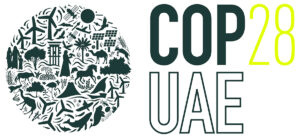
Summary and analysis from Pangolin Associates
Our contributors: Harry Knox, Maddy Rymill, Nimisha Ulliyada, and Thomas Lehmann.
- Loss and Damage Fund
- Phasing out fossil fuels and energy transition
- Renewable energy
- Decarbonisation
- Adaptation: food systems and agriculture, and health
- Carbon markets and reporting frameworks
- Future COP summits
- Post COP28: what can we do?
- Our contributors
Summary
World leaders, delegates, climate scientists, and lobby groups met in Dubai in the United Arab Emirates (UAE) for the 28th Conference of Parties (COP28) in what has been the warmest year on record where two days of the year have already exceeded 2°C above pre- industrial levels. Two degrees Celsius above pre-industrial levels is significant as it is the legally binding upper global limit agreed to by 196 countries in the Paris Agreement at COP21 – the COP that is generally considered the most successful to date.
While two days is not a large portion of the year, global average temperatures continue to trend upwards with little sign of abating. Therefore, we may have already failed in our efforts to slow human-induced climate change, let alone reverse it. So why has this occurred? Inaction by governments, vested interests, and energy addiction have all constrained meaningful reductions in global fossil fuel usage – the main driver of human-induced climate change.
For this reason, there was considerable controversy leading into the event in Dubai: as scepticism regarding how the COP’s President, Sultan Al Jaber, would separate his vested interest as the Chief Executive of the UAE’s state oil company, Adnoc. These fears were realised early with Jaber claiming there is ‘no science’ behind the demands for a phase out of fossil fuels, while later documented evidence emerged showing the Emrati politician trying to broker oil deals during the summit.
Despite these issues, there are positives to come from COP28, including the approval and operationalisation of a loss and damage fund, the inclusion of the ‘phasing down’ of fossil fuels, ramping up renewable energy, more investment into adaptation options, and greater collaboration in carbon markets.
COP28 also marked the first Global Stocktake (GST), which is a process for countries and stakeholders to assess both their individual and collective progress in meeting the goals of the Paris Agreement. After the stocktake, countries have two years to go away, review, and ratchet up their goals and ambitions.
While previously we spoke of short-term and long-term targets as if they were long in the distance – we are now starting to live in these moments.
COP28 UAE: outcomes
 Loss and Damage
Loss and Damage
The Loss and Damage Fund (the Fund) was one of the main focuses of COP27 in Egypt in late 2022 . This Fund recognises that the most vulnerable countries are likely to be most affected by human-induced climate impacts while being the least responsible for the problem. And these countries have the least in terms of means or adaptive capacity.
A commitment in 2022 established a fund that ensured industrialised nations and international financial institutions – both beneficiaries from fossil fuels for their prosperity – would compensate those nations experiencing the most devastating effects of climate change. While island nations hailed this as a way to restore trust in the international climate negotation process, a decision was not reached regarding which countries would contribute to the Fund.
On the opening day of COP28 the Loss and Damage fund moved from commitment to operational. Wealthy nations pledged a total of $792m USD during the conference. This includes Australia’s pledge of $100m AUD ($65.8m USD) towards climate finance for vulnerable Pacific countries. Early criticisms include that, as is, the Fund covers less than 0.2% needed and the money pledged is neither new nor additional.
Support regarding the structure of the Fund is also contentious: developing countries are unhappy that during the Loss and Damage Fund’s initial years the trustee will be the World Bank. Mainly, their concerns are the financial structure, the costs associated with the operation within the World Bank, and the lack of clarity over how to apply and receive funds.
 Phasing out fossil fuels and the energy transition
Phasing out fossil fuels and the energy transition
Despite the host country’s efforts to steer discourse away from fossil fuels, COP28 is categorised as the beginning of the end of the fossil fuels era as dependence on fossil fuels is expected to reduce towards the end of this decade.
The agreement calls on developing countries to take the lead in reducing fossil fuels in a just, orderly manner, with fossil fuels addressed for the first time in the language of the global climate deal. This deal, called the UAE Consensus, was signed by 200 countries after intense negotiations forced UN delegates to adapt the wording for all parties to come to the table.
Contention surrounding the terms ‘phase-out’ versus ‘phase down’ saw the latter selected: a significant decision. A phase out is to completely stop usage, while a phase down implies a reduction. Such small changes can have insidious effects as international treaties lead to national policy setting.
To measure the success of the collective ambition to date, COP28 addressed the first global stocktake which restates that global greenhouse gas emissions need to be cut by 43% by 2030 as compared to 2019 levels to limit global warming to 1.5°C. Additionally, the stocktake notes that if all currently pledged Nationally Determined Contributions (NDCs) are met, greenhouse gas emissions are projected to decrease by only 5.3% by 2030 as compared to 2019. This shows a massive gap between what was pledged and what is required.
There were some positive steps domestically at COP28, however, including Australia’s signature on the Glasgow Statement, an agreement that will stop Australia from funding foreign fossil fuel projects. Unfortunately, the Glasgow Statement does not prevent the continued extraction of fossil fuels onshore.
 Renewable energy
Renewable energy
Despite the lack of stronger language or complete reductions in energy derived from fossil fuels, a new series of initiatives was announced in Dubai. The so-called Global Decarbonization Accelerator (GDA) is designed to speed up the energy transition and decarbonise the existing energy system. The GDA includes the Global Renewables and Energy Efficiency Pledge which is signed by 116 countries, including Australia.
Signatories to this pledge agree to triple worldwide renewable energy generation capacity to a minimum of 11,000 gigawatts, as well as doubling the annual rate of energy efficiency improvements from two to four percent every year until 2030. The pledge has the potential to jumpstart investment in large-scale renewables, particularly in Australia where the pace of investment has slowed.
In another move designed to reduce reliance on fossil fuels, 27 countries – again including Australia – signed a Declaration of Intent for the mutual recognition of certification schemes for renewable and low-carbon hydrogen and its derivatives. Some countries went even further: 22 nations, excluding Australia, pledged to triple nuclear capacity by 2050.
 Decarbonisation
Decarbonisation
The GDA also includes the Oil and Gas Decarbonising Charter (OGDC), signed by 50 companies and representing 40% of global oil production .
The OGDC commits to zero methane emissions and putting an end to routine flaring, despite UAE committing to a policy 20 years ago of zero routine flaring while continuing to flare on an almost daily basis.
While reduction to methane emissions is important, scepticism around this charter is reasonable. The decarbonisation of fossil fuels is heavily reliant on technologies yet to be proven at scale, such as carbon capture utilisation and storage.
Adaptation
 Food systems and agriculture
Food systems and agriculture
The impact of climate change on global food systems and production is already felt with the poor and the vulnerable disproportionally affected. For this reason, the Declaration On Sustainable Agriculture, Resilient Food Systems, and Climate Action may be cause for apprehensive celebration. A total of 160 nations representing 5.7 billion people endorsed the declaration: 70 percent of food production, nearly 500 million farmers, and 76 percent of emissions from the global food system.
Notably, a key commitment is the integration of agriculture and food systems into National Adaptation Plans, Nationally Determined Contributions, Long-term Strategies, National Biodiversity Strategies and Action Plans, and other related strategies before the convening of COP30. This time-bound promise improves the transparency of progress tracking and accountability of the signatories.
COP28 also addressed regenerative agriculture. The Food and Agriculture Organization of the United Nations presented ‘Achieving SDG2 without breaching the 1.5C threshold: A Global Roadmap’, which aims to guide the agricultural sector at COP29 and COP30 with 20 key targets to be met between 2025 and 2050. Regrettably, funding for food systems lags behind but it is slowly starting to increase with most of the capital focused on climate resilience and land use management.
Unfortunately, direct actions are not detailed in the final text of COP28. Sustainable agricultural and land management practices, while encouraged, do not have explicit detail within the text on emissions reductions actions from the agricultural sector. This even though agriculture is the second largest emitting sector behind energy.
 Health
Health
COP28 held the first ever Health Day on December 3rd, an event that followed the ‘COP28 UAE Declaration on Climate and Health’. With 143 signatories, this declaration commits to the advancement of climate-resilient development, including the overall strengthening of health systems.
While the declaration marks the first time that a COP has acknowledged the growing health impacts of climate change and committed to ‘incorporating health considerations in the context of relevant Paris Agreement and UNFCCC processes’, again there is little in the way of discussion in the final text. Indeed, implementation of climate and health interventions needs to be accelerated and are part of the ongoing Sharm el-Sheik Adaptation Agenda – Implementation Report 2023, which outlines the global adaptation solutions agenda introduced at COP27.
Overall, the inclusions of food systems and health on the agenda at COP28 represents a step forward that will help to build climate resilience and develop abatement potential. However, ultimately the the phase out of fossil fuels is the most critical step to decarbonise such critical systems. Positive action for food and health globally is still at odds with the softer language used for fossil fuels.
 Carbon markets and reporting frameworks
Carbon markets and reporting frameworks
Carbon markets, both compliance-based and voluntary in nature, can play a key role in ensuring companies pay for their emissions through the purchase of offsets or credits that are generated from projects that store, reduce, or avoid greenhouse gas emissions. This, theoretically, allows the flow of capital from emissions intensive industries to developing economies, technologies, or less carbon intensive sectors.
Article 6 of the Paris Agreement includes details regarding the development of an international regulatory framework to enhance trade between carbon markets to allow greater flows of sustainable finance to projects and people that require the greatest support during the climate transition.
Voluntary carbon markets help the flow of offsets generated in one geographical location in exchange for capital in another. However, these offsets and offset markets have had ongoing issues regarding transparency, supply, and whether the offsets they trade reduce emissions.
Diplomats and envoys from key countries put their support behind these markets at COP28, with John Kerry labelling them as potentially ‘the largest market the world has ever known’. However, ultimately, countries were unable to agree on an international, United Nations-backed, carbon market due to disagreement over transparency. This again forces the private- sector to step up, which resulted in six of the world’s largest voluntary carbon markets, through the International Emissions Trading Association (IETA), agreeing to a framework that would try to overcome issues of scaling, integrity and transparency. Similarly, the Voluntary Carbon Markets Integrity Initiative (VCMI) launched a Code of Practice to help guide organisations that make claims about the use of carbon credits in their decarbonisation pathway.
Another key development in financial disclosure was the official end of the Task Force on Climate-related Financial Disclosures, as the ISSB Standards now presented through IFRS frameworks will supersede the TCFD. Changes to climate-related reporting requirements are felt in Australia already with the proposed Australian Sustainability Report Standards likely to be implemented from FY2025 onwards.

Future COP summits
While there was a great deal of criticism regarding the location of COP28 in the UAE where approximately 52% of total exports come from oil and oil-based products, in 2024 Azerbaijan will host COP29. This Eurasian country is another fossil fuel-producing nation with almost 95% of its total export revenue from oil and natural gas.
The full power of fossil fuel lobbies were ‘on show’ in Dubai, and with similar power also held by the domestic fossil fuel groups in Azerbaijan, questions are already mounting regarding the country’s selection as COP hosts next year.
Further to this, recent criticism has been levelled at both the Azerbaijani and European governments regarding energy related corruption, demonstrating again that fossil fuel interests run deep.
Even further ahead, Australia is vying to host COP31 in 2026. While Australians might like to consider themselves a more transparent, trustworthy choice it is only necessary to remember Australia’s political Climate Wars, that Australia has the second highest embodied CO2 emissions of exports per capita in the world, and that there will be a federal election in 2025.
Post COP28: what can we do?
You are not helpless in the fight against climate change, but it can be daunting to understand where you or your organisation can make the biggest impact. Below are some pointers on how to spur positive action.
Knowledge is key: educate.
You don’t have to be a climate scientist to take action but it helps to understand the basics. If you want to know more about climate change impacts, the following resources will help you get started:
- Read AR6,I (IPCC report published in 2021).
- Play the Climate Fresk Workshop: a three-hour gamified system and collaborative workshop which provides an overview of climate change and what is at stake.
- Use the Climate Council Resources.
- Take a look at the Drawdown Climate Solutions Course.
There is a business case for sustainability.
Climate change and climate action is complex. Consequently, there are varying degrees of understanding of the issues and the solutions and creating a business case for key stakeholders is imperative. It sends a compelling message and can influence decision making at your organisation. Ask for meaningful change including:
- Moving away from fossil fuels.
- Reducing consumption of virgin materials.
- Switching to 100% renewable electricity and, if possible, investing in clean energy generation.
- Improving and investing in energy efficiencies.
- Reducing non-energy related emissions.
- Reviewing your supply network and encouraging supply chain partners to review and reduce their own emissions.
- Ensuring that your financial institutions are making the right choices, e.g., not investing in fossil fuel projects.
- Allowing for creative but prudent finance towards climate projects and solutions.
- Understanding the risks will allow institutions and organisations to better monetise the risks and allow for greater flow.
- Offsetting any greenhouse gas emissions that your organisation cannot eliminate.
- Protecting biodiversity and natural carbon sinks through your offsetting choices.
- Initiating action.
- Showing climate leadership and setting an example for other organisations.
Frameworks can set you up for success.
Pangolin Associates’ motto is ‘measure, reduce, offset’:
- Measure your emissions with a Greenhouse Gas Assessment utilising the GHG Protocol framework.
- Next, reduce your emissions. Look at your business’ emissions hot spots and create a strategy for net-zero targets via the Science Based Targets initiative to achieve long-term emissions reductions.
- Finally, and in addition, invest in climate solutions all over the world and offset any residual emissions that cannot be reduced.
However, emissions are just one part of an extraordinarily complex picture of your organisational impacts. We urge businesses to consider the wider impacts. Frameworks that can help you understand and target these include:
- B corp certification.
- ISSB’s Standards: IFRS S1 and S2.
And – your voice can be your greatest asset.
Knowledge is power and understanding how our activities contribute to the climate crisis is the first step in being a part of the solution. Push your organisation to become a climate leader and to demonstrate that you are preparing for decarbonisation and the growing demand for genuine, transparent accountability.
With Australia committed to a transition away from fossil fuels, and as our representatives return home from COP28, all companies need to align with the federal government’s plan to ‘phase-down’: a reduction in fossil-fuel intensive business practices to begin while ceasing investments or partnerships with fossil-fuel producing companies.
Every organisation must support this transition. While the outcomes of the COP28 have not gone far enough, they provide a framework in which to operate. The onus is now on decision makers in the business community.
Our contributors
 Harry Knox
Harry Knox
Senior Consultant | Climate Solutions
Harry helps organisations transition towards a sustainable, accountable future. His expertise includes all aspects of environmental, social, and corporate governance (ESG).
 Maddy Rymill
Maddy Rymill
Senior Consultant | Climate Solutions
Maddy assists clients with GHG assessments, Climate Active certification, and Science Based Targets consulting. Maddy is also CPA certified and provides third party verifications.
 Nimisha Ulliyada
Nimisha Ulliyada
Senior Consultant | Climate Solutions
Nimisha leads one of Pangolin’s technical teams and specialises in NGER, Climate Active certification, and GRESB reporting.
Nimisha also has expertise in Environmental, Social, and Corporate Governance (ESG) where she focuses on ISSB.
 Thomas Lehmann
Thomas Lehmann
Consultant | Climate Solutions
Thomas’s specialisations include GHG assessments, Life Cycle Assessments (LCAs), and helping organisations with Climate Active carbon neutral certification processes.

 Loss and Damage
Loss and Damage Phasing out fossil fuels and the energy transition
Phasing out fossil fuels and the energy transition Renewable energy
Renewable energy Decarbonisation
Decarbonisation Carbon markets and reporting frameworks
Carbon markets and reporting frameworks Harry Knox
Harry Knox Maddy Rymill
Maddy Rymill Nimisha Ulliyada
Nimisha Ulliyada Thomas Lehmann
Thomas Lehmann